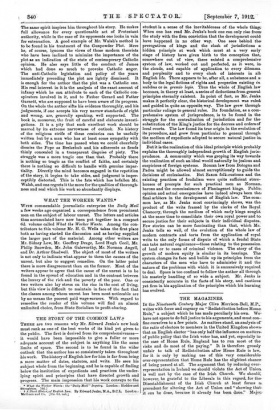THE STORY OF THE COMMON LAW.t
THERE are two reasons why Mr. Edward Jenks's new book must rank as one of the best works of He kind yet given to the public. The first is derived from its comprehensiveness— it would have been impossible to give a fuller or more adequate account of the subject in anything like the same limits of space. The second is to be found in the wider outlook that the author has so consistently taken throughout his work. The history of English law for him is far from being a mere matter of dates, statutes, and writs. He sees his subject whole from the beginning, and he is capable of finding below the institution of expedients and practices the under- lying spirit and principles that have directed growth and progress. The main impression that his work conveys to the • What the Worker Wants the "Daily Mail" Inquiry. London : Hodder and Stoughton. (6d.] f A Short Iltstcry of English Law. By Edward Jenks, H.A., B.C.L. London : Methuen and Co. [les. 6:1. net.] student is a sense of the inevitableness of the whole thing: When one has read Mr. Jenks's book one can only rise from the study with the firm conviction that the development could have happened in no other way. One sees behind the prerogatives of kings and the clash of jurisdictions a hidden principle at work which must at a very early stage of history have given birth to the conception that, somewhere out of view, there existed a comprehensive- system of law, worked out and perfected, as it were, in. the clouds, and capable of application to every dilemma and perplexity and to every clash of interests in all English life. There appears to be, after all, a substance and a- body to the legal fictions of rights and properties existing in nubibus or in gremio legis. Thus the whole of English law becomes, in theory at least, a series of deductions from general principles eternally existent. In point of fact, as Mr. Jenks makes it perfectly clear, the historical development was ruled and guided in quite an opposite way. The law grew through particular rulings to general rules. Its foundation, as a com- prehensive system of jurisprudence, is to be found in the struggle for the centralization of jurisdiction and for the substitution of the King's justice for the decrees and orders of local courts. The law found its true origin in the evolution of its procedure, and grew from particular to general through the medium of expedients adopted to secure natural justice in individual cases.
But it is the realization of this ideal principle which probably explains the thoroughly independent growth of English juris- prudence. A community which was groping its way towards the realization of such an ideal would naturally be jealous and suspicious of foreign systems. Roman law from Bologna and Padua might be allowed almost surreptitiously to guide the decisions of ecclesiastics. But Saxon folk-customs and the. existing practices of feudalism were quite sufficient store- houses of precepts for such practical men as Norman. barons and the commissioners of Plantagenet kings. Public, opinion and actual emergencies have indeed always been thee final arbiters in the development of English law. The com- mon law, as Mr. Jenks most convincingly shows, was the product of the writs framed by the clerks of the Royal. Chancery, through the medium of which early kings sought at the same time to consolidate their own royal power and to secure justice for their subjects in their individual disputes. Few stories can be more fascinating than that, which Mr. Jenks tells so well, of the evolution of the whole law of modern contracts and torts from the application of royaL writs to the only forms of dispute of which a feudal State can take natural cognizance—those relating to the possession. of land or to cases of criminal violence. The story of the growth of modern equity is similar in its bearings. The system changes its face and builds up its principles from the characters of the men who have to administer it and the nature of the problems with which it is successively required to deal. Space is too confined to follow the author all through his masterly handling of so wide a subject. Mr. Jenks is consistently accurate in the facts of his story, and cautions yet firm in his application of the principles which his learning has evolved.






































 Previous page
Previous page